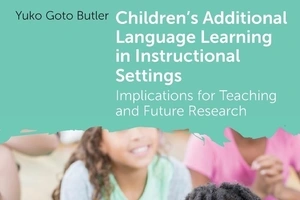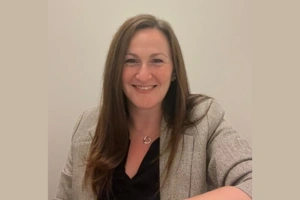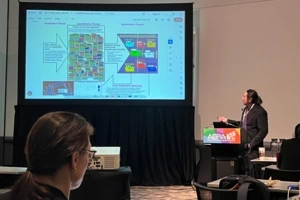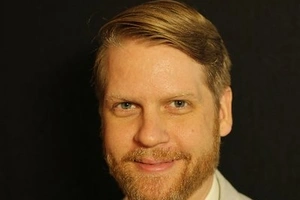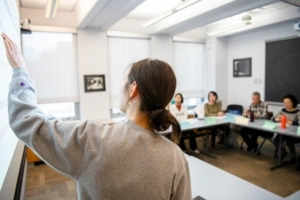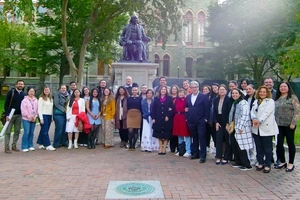Faculty Expert
Penn and Penn GSE have a long-standing relationship with West Philadelphia’s Henry C. Lea Elementary School. Recently, Penn announced a five-year agreement with the School District of Philadelphia and Philadelphia Federation of Teachers to provide more than $800,000 in funding and in-kind services annually to Lea. Racially and ethnically diverse, Lea families originate from 19 different countries with more than 15 different languages represented at the school. Fourteen percent of its student population is learning English as a second language, while 15 percent of students have an Individualized Education Plan. Although many have celebrated this increased investment in the partnership with Lea, some community members have voiced concerns about the arrangement, ranging from who controls the direction of the school to whether Lea would stay committed to its current student community to whether Penn GSE could be invested in the needs of a larger number of schools.
We asked GSE Dean Pam Grossman and Lea Principal Aaron Gerwer about the partnership, its history, and their shared vision for prioritizing the needs and desires of the Lea community.
Q. Penn’s partnership with the Lea School goes back more than half a century but has grown significantly over the past decade. What spurred the decision to deepen that relationship, and what was the impetus behind such a momentous agreement?
Dean Grossman: When I joined GSE in 2015, I was really interested in how the graduate school could have an impact in the local community in ways that were responsive to the community’s vision, not what we thought they needed. It was important that our partnerships were always rooted in dialogue. When I began my deanship, GSE already had a partnership with Lea, and I visited Lea within the first few weeks of my arrival. From the beginning, we began exploring ways that we could more consistently partner with the school to support teachers, students, and families.
We’ve been providing support for professional development in both math and literacy at Lea for a number of years. When I arrived, GSE already had a faculty member working closely with Lea. At a former principal’s request, we hired a partnership coordinator — Dr. Caroline Watts — in 2013 to work closely with the principal, and it really blossomed from there. Each year, the principal and Watts would identify needs for the school, and we worked with Penn to meet those requests. When Lea said they needed after-school programs, a family and community engagement liaison, and the ability to build social-emotional learning into their curriculum, we worked with them to find and fund those resources, even if these partnerships went beyond Penn.
Although Penn has been contributing an average of over $300,000 annually in funding and in-kind services over the past five years, we realized it would be helpful to the school to have more sustainable support for the principal’s vision. We have been heartened by the ways Lea has grown over the past several years, and this investment will only accelerate that improvement by giving the school the resources to respond to the immediate and growing needs of the students.
Principal Gerwer: When I came on board as principal in 2020, there was a wonderful foundation in place supported by the partnership between Penn and Lea. Our school has a carefully designed partnership program that provides our students with a variety of programming and connections to learning experiences to which they would not have otherwise had access without those partnerships. We have dedicated and long-standing math and literacy coaches who provide support for our teachers, a family and community engagement liaison who has built rich relationships with our families over the years, and an incredible after-school program that offers enrichment for the whole child — all provided through our relationship with Penn.
My focus at Lea has been to build on these successes with a student-centered, community-based approach that integrates our existing supports into instruction and learning to ensure that students benefit from the resources and connections in our community. We’re going to increasingly move into project-based learning, which is a model for teaching and learning in which Penn GSE has a great deal of expertise. This will be a gradual shift that we will be working towards in collaboration with staff, families, and students. Our focus will be on providing students with opportunities to demonstrate their understanding, skills, and knowledge by exploring big questions and creating projects that showcase their learning. Rather than placing the highest value on tests that assess memorization and skill application, we will empower our students to demonstrate their knowledge, skills and, most importantly, understanding through application. An example would be a test that assesses your knowledge of angles and forces versus a project through which designing a roller coaster requires you to demonstrate the knowledge of the necessary theorems and skills needed to complete them, along with the understanding of how these theorems could be applied to design something useful in the real world — and all while trying to answer the big question, “How can I use math to create joy?”
Q. How does community input drive the future of Lea?
Gerwer: As our school’s principal, I am committed to leading a process through which our school community can discuss and design together a strengthened partnership to achieve our collective goals. I am committed to making this process inclusive, most importantly by engaging with the diverse communities that make up our Lea school community — including students, families, school staff, partners, community members, the Philadelphia Federation of Teachers, the School District of Philadelphia, and Penn. And I am committed to a process that is equitable and open so we hear and listen to the many and varied interests and needs of the members of our school community.
Thoughtfully designing together ensures that our school continues to reflect the hopes, dreams, and wisdom of our diverse community.
Grossman: Our partnership is rooted in a shared vision for Lea as a community school that is responsive to the goals and desires of the school community and neighborhood. Principal Gerwer is engaged in a series of meetings with the community that will help shape the future direction of the school. As Lea goes through its community visioning process, Penn GSE will be there with expertise and resources to help that vision come to life on behalf of the students.
Q. What are you most excited about for this partnership?
Grossman: We’re excited by the opportunity to work with Principal Gerwer and his staff to help make the school’s vision for Lea students a reality. GSE is committed to expanding educational opportunities for more young people in West Philadelphia, and we believe that our work with Lea will help accomplish the goal of creating a community school model that really serves Lea’s families and surrounding community.
Gerwer: The opportunity to provide our students, staff, and community with much-needed opportunities and supports that will allow us to provide a student-centered, community-connected educational experience for our students, families, and staff.
Q. What makes the school special?
Grossman: Lea is truly a neighborhood community school, with a long history of deep commitment to young people and their families. There’s a warmth and heart to the school that everyone feels from the moment they walk in the door. The school serves a range of students who come there for the inclusive and specialized environment — students from many countries, students who speak many different languages, who learn in different ways. This rich diversity of backgrounds and experiences truly makes Lea a special place.
Gerwer: Lea is the school that loves you back! Lea is an incredibly diverse and vibrant community with a rich history. We have a strong commitment to providing special education services and an open and supportive environment for families and students who speak English as a second language. We receive students from throughout the district based on the strength of our programs. We are excited that Penn is providing additional support to continue to bolster all of our programs — including ESOL, special education, and other school programming — in hopes that our programs can serve as a model for providing a progressive education to all students. As a former special education teacher, I firmly believe that a school isn’t successful unless all of its students are loved, supported, and empowered to reach their potential.
A few more questions for Dean Grossman
Q. Some community members have voiced concerns that Penn’s increased investment in the Lea School will echo its involvement with the Penn Alexander School. What has Penn learned from its experience with Penn Alexander, and how does this partnership differ from that one?
Grossman: These partnerships represent very different models of school-university partnerships, fueled by different visions. In the case of Lea, Penn is working with an existing public school with its own history, culture, and challenges rather than starting a new school from the ground up. While both partnerships share a goal of student success, the partnership with Lea will be guided by the existing school leadership. Principal Gerwer, the teachers, and the families will determine the vision and how best to use the financial support and other resources to be successful.
It’s quite different to develop a partnership with an existing school, faculty, and student body with a long-standing history in the community. We have been very mindful of these differences over the last few years as our work together at Lea has deepened, and we want to continue to listen and respond to the school and community as a core part of this collaborative improvement process.
The Lea agreement differs from the Sadie Tanner Mossell Alexander (aka Penn Alexander) relationship in many ways. Penn Alexander was launched in 2001 as an entirely new West Philadelphia school with a shared vision developed by Penn, the Philadelphia Federation of Teachers, and the School District of Philadelphia. Penn Alexander was built at a time and in a place when the leaders of the Spruce Hill section of University City were requesting improved public school options. Lea and Wilson elementary were crowded and under-resourced. Penn responded at that time with a unique proposition which was accepted by the local residents, the teachers’ union and the District. At Penn Alexander, Penn pays for a full-time community and family liaison and annual per-pupil funding to reduce class size. As with many Philadelphia schools, Penn GSE student teachers are placed there, and other professional development opportunities are available. The processes in each school are different. The Lea partnership model has those elements but is focused on integrating community and parent efforts with University resources to establish Lea as a community school supporting excellence for all. In the past, this has included an extraordinary range of partnerships for the school, ranging from Penn supplying student nurses to free dental care to a music program and counseling interns. The Lea community and family liaison Rich Liuzzi, who works with the Lea principal and Penn’s Caroline Watts, has also developed and nurtured outside partnership opportunities for the Philadelphia Orchard Project, Devereux Advanced Behavioral Health, Philadelphia Young Playwrights, and many others.
Q. When you became dean of the Graduate School of Education in 2015, you quickly moved to form the Office of School and Community Engagement. How has the OSCE impacted Penn GSE’s interactions with the West Philly community, and how has that work reflected your vision for how Penn GSE should involve itself with West Philadelphia?
Grossman: One of the things that most attracted me to the deanship here was Penn GSE’s commitment to the community. I believe that schools of education must strive to be a positive force in area schools and respond to the needs of practitioners and leaders in those schools. To support this work, I launched the Office of School and Community Engagement in 2015 led by director Caroline Watts. Much of the work we had done previously was more piecemeal, but with dedicated staffing and funding, we could deliver on a more responsive engagement with Philadelphia schools.
The Lea School partnership is just one example of the community-informed initiatives Penn and the GSE have invested in throughout West Philadelphia over the past seven years. In addition to our work with partnership schools, we also work across the schools in West Philadelphia to provide a range of professional development for teachers, summer programming for students, and technology resources. We have worked closely with the Assistant Superintendents of Learning Network 2 — Sean Conley and Rahshene Davis — to respond to their requests for support. The Responsive Math Teaching project is an excellent example for the work we’re doing across the network. This effort, led by Caroline Ebby and Caroline Watts, has provided support to 15 schools for developing stronger math teaching and learning. Last summer, we partnered with the Netter Center to launch a summer program serving more than 200 students in West Philadelphia; we’ll be running that program again this summer. Additionally, we have programs, students, and staff in more than 135 area schools, all working to respond to the needs of practitioners. Some of these schools receive a variety of support and resources, based on their requests and needs. Our goal is always the same: to improve educational attainment in Philadelphia.
Q. What proportion of Penn GSE’s involvement in West Philadelphia do the Lea and Alexander schools represent? What are some of the other community-oriented projects under way right now that people might not have heard about?
Grossman: Davis and Conley have been wonderful collaborators in bringing resources to Learning Network 2 — from software to instructional coaching to the new summer program we launched last year for students coming out of months of virtual learning. The work we’re doing now spans the many different elementary schools in this network, and it has all been in direct response to expressed needs and requests of the Assistant Superintendents. Right now, we’re working to expand our supports for the network in the areas of literacy and math, project-based learning, and mental health. For example, our “Bridging Gaps and Building Capacity” program’s slate of enrichment and reinforcement experiences in literacy, math, social and emotional learning, and counseling has since been adopted into a menu of support services being rolled out by the OSCE and offered to schools throughout the learning network. Rather than providing a set list of specific resources, this approach gives each individual school the agency to determine what would most fulfill their needs and benefit their community.
However, it’s important to note that Penn is invested in the entire school district — citywide — as well as the West Philadelphia public school students, families, and teachers closest to us. We are in every catchment in the city. I encourage people to take a look at this heat map we developed that captures the work we do across the district.
Media Inquiries
Penn GSE Communications is here to help reporters connect with the education experts they need.

